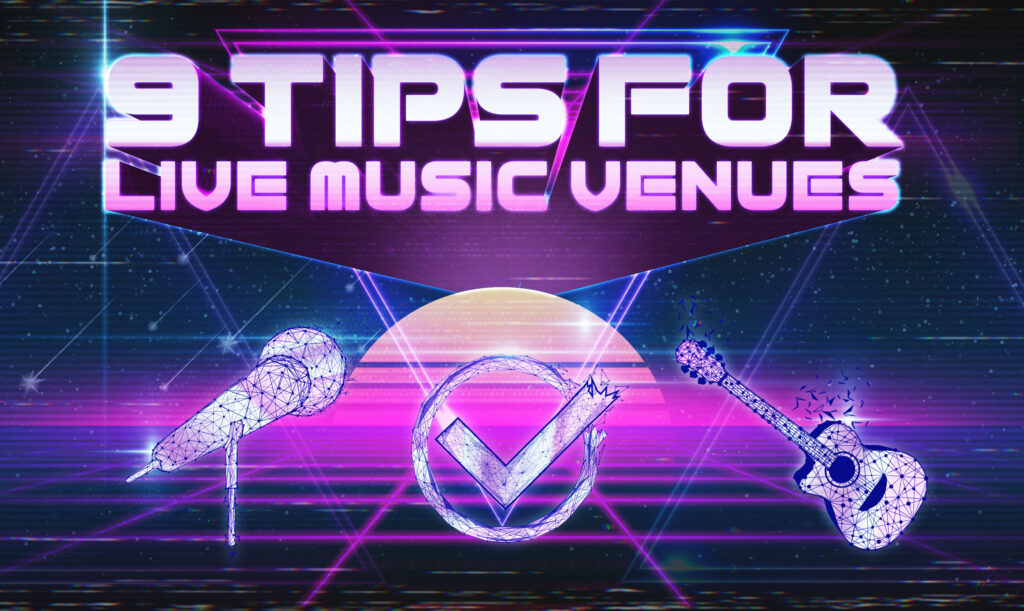
9 Tips to Make Your Live Music Venue More Successful
Live music venues are entering uncharted waters as the industry experiences rapid growth. With promoters and venue operators striving to create unique experiences for bands and audiences, the competition is fierce. As crowds return to live events, venues have the opportunity to fine-tune their operations and refocus on long-term goals to build their businesses.
While it’s impossible to predict which shows will be a hit, implementing a few proven tactics can help venues stay relevant to their audience and ensure their live music events reach their full potential. Here are some tips for venue operators looking to capitalize on the resurgence of live music.
1. Consider training an ongoing process
There are many variables to getting live music venues right, but if there was one practice we would recommend, it would be training your staff thoroughly and regularly. This is especially useful in a high turnover industry like live music, where staff members may come and go frequently.
Training might be different for various concert types, while recognizing that no one-size-fits-all. Training should include how to handle the unexpected and when to ask for help – this will go a long way in quality control and partner relations for your venue. Successful music venues provide comprehensive basic training for all levels of staff while helping personnel hone their skillset through experience so that they continually improve.
It’s common for trainees to forget their initial training, but studies suggest that practical experience and repetition help reinforce it. Therefore, it’s important to provide additional training and reminders regularly, to minimize errors and reinforce best practices. Having an established routine of regular training every week/month/season keeps your team on top form. Pro-tip: debrief after events and evolve training topics as your business grows and new learnings come to light. Also, remember to empower seasoned staff to train new team members. This teaching experience will help reinforce their own training.
2. Find the best venue management technology
Concert organizers and venues need to keep track of a dizzying amount of information—a process that has been transformed by digital, cloud-based technology. Live music management software can now help keep track of bookings, ticket sales, expenses, revenue, payments, critical documents and more– keeping your staff aware of key details as the show develops in real time.
Venues also need to maximize the guest experience through technology, and there are many ways to do that. Besides the sound system, lighting and show-related tech, connectivity should be a priority. Installing Wi-Fi capable of handling the crowd and ensuring guests are connected to the outside world is good for fans and your venue. If the show is taking off, you want attendees posting great photos and videos to their favorite outlets. Meanwhile, guest check-in should be simple and straightforward with the right virtual tools.
Related: How to set S.M.A.R.T. goals for the growth of live music venues
3. Engage in organic upselling and cross-selling
Finding new audiences is great, but existing customers are usually better drivers of sales and profits. Creating immersive virtual spaces can be an excellent way to extend profits by upselling and cross-selling to fans already planning on coming to your venue. Offering guests tiered ticketing options, such as a regular ticket to VIP access (upselling) or adding a venue tee-shirt to a purchase (cross-selling), can markedly increase your revenue per customer.
If you rent out your venue, training your staff to upsell clients renting your space can be another moneymaker. Concert planners are often interested in upgrades in AV equipment, catering, décor, and more as they assemble the best possible show. Being overly aggressive might not be appropriate, but well-trained personnel can significantly improve revenue through upselling.
4. Consider sustainability
Venue operators should have a sustainability plan for multiple reasons. Recycling and eco-friendly products are not only good for the planet, but they’re increasingly becoming expected by many concertgoers.
Beyond doing right for the earth and customer expectations, venue operators can take advantage of tax incentives and rebates while improving their energy costs. With the Inflation Reduction Act, businesses can get large rebates for solar PV systems, battery storage, energy-efficient appliances, and more. Venues should be able to improve their tax outlook in the short term and drive down long-term utility costs with a sustainability plan.
5. Know the importance of networking
Collaboration is even more important now than it was even just a few years ago. New challenges have created major staff shortages, forcing venue operators to stay on the lookout for capable personnel. One of the best ways to mitigate this industry-wide problem is by creating a reliable network of music professionals. Networking with booking agents, concert planners, vendors, and other venue managers can keep you in touch with local personnel and help you maintain a viable staff.
It should also help you initiate new business and stay on top of industry trends. Developments like a rise in live music co-productions point out that collaboration is now a mainstay, providing pathways forward for enterprising music professionals. By successfully connecting with industry peers, venue operators stay in a position to go wherever the trends take live music.
6. Know how to generate and use feedback and research
Guest feedback is a cornerstone of the entertainment business. Concertgoers love to share their thoughts while the buzz of the concert is still fresh, making it an excellent time to generate feedback. An easy feedback process that lets guests quickly complete a survey, feedback form, or review can be very beneficial to the venue.
Plentiful feedback then gives you an edge on retraining staff and recalibrating to improve the concert experience. Feedback helps operators anticipate new trends and research how to resolve issues. Without regular feedback from guests, it’s very difficult to see the venue from their perspective.
7. Tap the benefits of data analysis
Any business needs to harness the power of data in today’s competitive marketplace. Venue operators should be collecting data on revenue, show bookings, and real-time expenses, which then guide business strategies and adjustments. Not consistently using data in live music is an easy way to lose a competitive edge.
But keeping track of your data doesn’t have to be a mind-numbing chore. Enhanced data tracking can make sense of trends for you, allowing you to take advantage of opportunities that used to be difficult to identify. As automation increases its footprint in live music, venue operators can take advantage of the shift.
8. Specialize to separate from the competition
Creating a positive brand can be critical for any live music venue. One way to do that is by generating a unique atmosphere and focusing on what you do well. If your venue is ideal for facilitating a music lover’s dream wedding, you can create lasting value by marketing your venue from that perspective. Specialization can hone your business to the best features of the venue and make it easy to enhance your reputation through word-of-mouth.
Related: How to build powerful connections between artists, venues, and other agencies
It should also differentiate your offerings from the competitors in the space. Venues that build a reputation for certain events will have an advantage in attracting clients and keeping costs down while servicing the event. For corporate conferences and events, specialization can also lead to a substantial amount of repeat business.
9. Understand how flexible pricing is a game-changer
Ticket prices can now change much faster than in the past, with AI-enhanced data allowing them to automatically fluctuate to demand. This type of dynamic pricing has caused some controversy, as demand surges have led to eye-popping ticket prices in some cases.
But savvy venue operators can use flexible pricing in other ways as well. Giving repeat guests lower prices can create loyalty and generate long-term revenue. If prices do need to increase to meet rising costs, a discount for loyal customers is usually greatly appreciated – especially when complemented by a special VIP package.
Venues should also shift pricing based on seasons and holidays, a task that is much easier with real-time data. Off-peak pricing can help you maintain a steady revenue stream in slower parts of the calendar while connecting with guests who might return at a later date.
Other important practices for live music venues
There are many other ways to ensure your venue is functioning as it should, such as:
- Getting involved in the community. Live music is still mostly a local phenomenon. Community events and charity functions are excellent ways to promote a venue’s values, network with community leaders, and interact with potential customers.
- Artist treatment. Your reputation can take a hit on multiple fronts without proper artist treatment. A venue’s ability to attract talent can quickly decline, but artists are also fan ambassadors. Treat an artist poorly and there will likely be negative follow-through by the fan base. Artists can also be generous in spreading positive word-of-mouth for venue operators who exceed expectations.
- Creating an appropriate crisis plan. Safety and security remain essential for venue operators and industry professionals. Having a thorough (but flexible) emergency plan is important, but it’s just as critical to make that plan easily accessible to guests. Strong communication and foresight are key elements of maintaining a responsible atmosphere.
- Looking for ways to continuously improve. Live music is a game that is always changing, which is why venues have to improve in order to meet customer expectations. Successful operators regularly turn customer feedback into new training and venue improvements. Limiting negative experiences is made possible by post-event evaluation and active problem-solving.
Unlocking your music venue’s potential
It’s an exciting but nerve-racking time in live music. The opportunities are there for music venues of all different types, but operators must create an infrastructure that can capitalize on the current state of the industry. Venues need to find ways to enhance the guest experience and improve their brand, which can create loyal customers while organically reaching new ones.
One of the ways venue operators are doing more with less is with modern, music-first technology. Today’s best platforms provide a critical boost of data analysis, organization, and communication in the areas you need it the most. Prism’s all-in-one live music management software can keep your venue organized and illuminate new opportunities to explore. Contact Prism to learn more about how our platform can improve your venue’s operation.

Matt Ford is the founder and CEO of Prism.fm, an Austin-based software company revolutionizing live music event management. With a background in entrepreneurship and a degree from the University of Wisconsin-Madison School of Business, Ford combined his self-taught coding skills with firsthand experience as a concert promoter to address the inefficiencies he observed in the industry. In 2018, he launched Prism.fm, an all-in-one platform designed to streamline operations for venues, promoters, and agencies by replacing cumbersome spreadsheets with integrated tools for booking, financial tracking, and contract management. Under his leadership, Prism.fm has grown significantly, achieving $3 million in annual recurring revenue post-COVID and securing over $15 million in funding . Ford’s commitment to building user-centric solutions has positioned Prism.fm as a trusted partner for over 1,500 venues and promoters worldwide.



